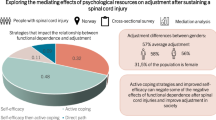Abstract
Study design:
Pre-test and post-test designs with 14 participants. Measurements were taken at baseline (T1), immediately after the intervention (T2) and at 3-month follow-up (T3).
Objectives:
Psyfit is an online self-help program designed to enhance well-being in persons with depressed mood. We examined the feasibility of Psyfit in people with spinal cord injury (SCI).
Setting:
Community, the Netherlands.
Methods:
Participants chose two of the six Psyfit modules. The researcher maintained telephone contact with the participants. Feasibility was inferred from the completion rate of the modules and feedback from the participants. Outcome measures were the Mental Health Inventory-5, the Center for Epidemiological Studies Depression scale and the Warwick-Edinburgh Mental Well-Being Scale.
Results:
Overall, 75% of the first module and 39% of the second module were completed. Seven participants were considered as study completers and were included in the evaluation. They evaluated Psyfit as a useful program and helpful for persons with SCI. Several technical problems were reported that mainly concerned browser compatibility. An increase in mental health and nonsignificant change of well-being were found at the end of the intervention period, but these were not maintained at follow-up.
Conclusion:
Psyfit seems a potentially feasible program. However, adaptation to the SCI population and further study with a controlled design and utilizing a larger sample size are necessary before it can be recommended as part of SCI rehabilitation.
Similar content being viewed by others
Log in or create a free account to read this content
Gain free access to this article, as well as selected content from this journal and more on nature.com
or
References
Post MW, van Leeuwen CM . Psychosocial issues in spinal cord injury: a review. Spinal Cord 2012; 50: 382–389.
Sinnema H, Franx G, Spijker J, Ruiter M, Haastrecht van H, Verhaak P et al. Delivering stepped care for depression general practice: results of a survey among general practitioners in the Netherlands. Eur J Gen Pract 2013; 19: 221–229.
Straten, van A, Hill J, Richards DA, Cuijpers P . Stepped care treatment delivery for depression: a systematic review and meta-analysis. Psychol Med 2014; 26: 1–16.
Fann JR, Crane DA, Graves DE, Kalpakjian CZ, Tate DG, Bombardier CH . Depression treatment preferences after acute traumatic spinal cord injury. Arch Phys Med Rehabil 2013; 94: 2389–2395.
Bolier L, Haverman M, Westerhof GJ, Riper H, Smit F, Bohlmeijer E . Positive psychology interventions: a meta-analysis of randomized controlled studies. BMC Public Health 2013; 13: 119.
Dorstyn D, Mathias J, Denson L . Applications of telecounselling in spinal cord injury rehabilitation: a systematic review with effect sizes. Clin Rehabil 2013; 27: 1072–1083.
Migliorini C, Tonge B, Sinclair A . Developing and piloting ePACT: a flexible psychological treatment for depression in people living with chronic spinal cord injury. Behav Change 2011; 28: 45–54.
Bolier L, Haverman M, Kramer J, Westerhof GJ, Riper H, Walburg JA et al. An internet-based intervention to promote mental fitness for mildly depressed adults: randomized controlled trial. J Med Internet Res 2013; 15: e200.
van Leeuwen CM, van der Woude LH, Post MWM . Validity of the mental health subscale of the SF-36 in persons with spinal cord injury. Spinal Cord 2012; 50: 707–710.
Miller WC, Anton HA, Townson AF . Measurement properties of the CESD scale among individuals with spinal cord injury. Spinal Cord 2008; 46: 287–292.
Tennant R, Hiller L, Fishwick R, Platt S, Joseph S, Weich S et al. The Warwich-Edinburgh Mental Well-being Scale (WEMWBS): development and UK validation. Health Qual Life Outcomes 2007; 5: 63.
Christensen H, Griffiths KM, Farrer L . Adherence in internet interventions for anxiety and depression. J Med Internet Res 2009; 11: e13.
Davis MJ, Addis ME . Predictors of attrition from behavioral medicine treatments. Ann Behav Med 1999; 21: 339–349.
Hall JA . Psychological-mindedness: a conceptual model. Am J Psychother 1992; 46: 131–140.
Dorstyn DS, Mathias JL, Denson LA . Efficacy of cognitive behavioral therapy for the management of psychological outcomes following spinal cord injury: a meta-analysis. J Health Psychol 2011; 16: 374–391.
Dorstyn DS, Mathias JL, Denson LA . Psychosocial outcomes of telephone-based counselling for adults with an acquired physical disability: a meta-analysis. Rehabil Psychol 2011; 56: 1–14.
Kelders SM, Kok RN, Ossebaard HC, Van Gemert-Pijnen JE . Persuasive system design does matter: a systematic review of adherence to web-based interventions. J Med Internet Res 2012; 14: e152.
Tkachuk GA, Marshall JK, Mercado AC, McMurthy B, Stockdale-Winder F . Readiness to change predicts outcomes of functional rehabilitation following motor vehicle accident. J Occup Rehabil 2012; 22: 97–104.
Prochaska JO, Velicer WF, Rossi JS, Goldstein MG, Marcus BH, Rakowski W et al. Stages of change and decisional balance for 12 problem behaviors. Health Psychol 1994; 13: 39–46.
Author information
Authors and Affiliations
Corresponding author
Ethics declarations
Competing interests
The affiliation of LB, Trimbos Institute, is the developer of Psyfit. Neither LB nor the institute itself derives financial outcome from this intervention.
Rights and permissions
About this article
Cite this article
Verwer, J., van Leeuwen, C., Bolier, L. et al. Feasibility of an online well-being intervention for people with spinal cord injury: a pilot study. Spinal Cord 54, 473–477 (2016). https://doi.org/10.1038/sc.2015.165
Received:
Revised:
Accepted:
Published:
Issue date:
DOI: https://doi.org/10.1038/sc.2015.165
This article is cited by
-
New psychometric evidence from the Revised Mental Health Inventory (R-MHI-5) in Peruvian adolescents from a network psychometrics approach
BMC Psychology (2024)
-
Spanish Version of the Revised Mental Health Inventory-5 (R-MHI-5): New Psychometric Evidence from the Classical Test Theory (CTT) and the Item Response Theory Perspective (IRT)
Trends in Psychology (2022)
-
Guided internet-delivered cognitive-behaviour therapy for persons with spinal cord injury: a feasibility trial
Spinal Cord (2020)
-
Computer and internet use among people with long-standing spinal cord injury: a cross-sectional survey in the Netherlands
Spinal Cord (2019)
-
Telehealth for people with spinal cord injury: a narrative review
Spinal Cord (2018)


